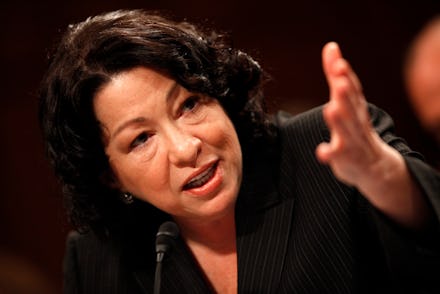All 3 Female Justices Wrote a Blistering Dissent Over a New Controversial Birth Control Case

The news: While the Hobby Lobby ruling may have been voted along party lines, there is another important factor that divided the vote: gender.
Justice Stephen Breyer was the only male member of the Supreme Court who dissented on the Hobby Lobby ruling on Monday, joining the high court's three female justices. And that gender divide became even more apparent on Thursday, when the Court weighed in on another case involving health care coverage of contraceptives. The case resulted in a temporary win for Wheaton College, an evangelical school in Illinois, and led to fiery dissent from three justices — all of whom happened to be female.
"Those who are bound by our decisions usually believe they can take us at our word. Not so today," Justice Sonia Sotomayor wrote in her dissent, with Justices Elena Kagan and Ruth Bader Ginsburg joining her. "That action evinces disregard for even the newest of this Court's precedents and undermines confidence in this institution."
What is the case about? Much like the Hobby Lobby ruling, the Wheaton College suit involves contraceptive coverage by religious groups — but it goes even further.
Under Obamacare, religious organizations can opt out of providing contraception by allowing a third party to do so; all they need to do is submit a form to the federal government and their independent health care provider, explaining their religious objection.
But Wheaton College believes that even the act of submitting a form is a violation of its religious rights: It fundamentally disagrees with the concept of contraceptives, and doesn't want to play any part in helping to provide them.
And the court has agreed. For now, Wheaton College can submit its exemption form straight to the federal government, forcing Health and Human Services to make the arrangements to provide contraceptive coverage for the Wheaton community. And while the ruling is only temporary, it does indicate which way the majority of justices are leaning on the issue.
The reason for dissent: The big issue that Sotomayor tackles in her dissent is the fact that Thursday's decision is in direct contrast to the Hobby Lobby ruling from just three days earlier. After all, justices such as Samuel Alito have admitted that they supported Hobby Lobby because the federal government and third party providers would have other avenues to provide contraceptive coverage; the Wheaton decision will burden this process and ultimately make it harder to carry out this care.
"The court's actions in this case create unnecessary costs and layers of bureaucracy, and they ignore a simple truth: The government must be allowed to handle the basic tasks of public administration in a manner that comports with common sense," Sotomayor wrote.
And just in case you had any doubt about where the female justices stand on this issue: "I do not doubt that Wheaton genuinely believes that signing the self-certification form is contrary to its religious beliefs," Sotomayor added. "But thinking one's religious beliefs are substantially burdened — no matter how sincere or genuine that belief may be does not make it so."